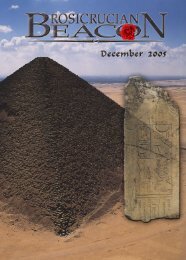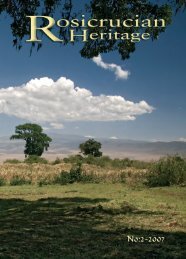Rosicrucian Beacon Magazine - 2012-09 - AMORC
Rosicrucian Beacon Magazine - 2012-09 - AMORC
Rosicrucian Beacon Magazine - 2012-09 - AMORC
- No tags were found...
Create successful ePaper yourself
Turn your PDF publications into a flip-book with our unique Google optimized e-Paper software.
desire to know and their yearning for happiness. We donot live in a vacuum, but in a world which has definitemodes of procedure, known as the ‘laws of nature’.Moreover, we also have definite characteristics. We haveour human nature, which is largely inherited, but subjectto modification by social and individual effort. This mustalso be taken into account by anyone who earnestly desiresa good and happy life. Only by understanding ourselvesand the world can we intelligently pursue our highest goalsand set happiness on a firm foundation.The great systems of Greek philosophy sprang fromthe intimate union of two fundamental and interrelatedhuman interests: the thirst for knowledge and the yearningfor happiness and fulfilment. Essentially there were threedivisions to Greek thinking: logic, physics, and ethics.• Logic is the study of pure thought, independentof any objects.• Physics is the study of how things happen in theworld of material objects.• Ethics is the study of how things ought tohappen in the world of human beings.With such a vast field, the cultivation ofphilosophy became a large undertaking, fit toengross one’s best faculties for a whole lifetime.Some thinkers placed more emphasis on onedivision of philosophy than on another. Socrates(c.469-399 BCE), one of the pioneers, was scarcelyinterested in physics; but in his later years he seemsto have devoted most of his time to impressing on hiscontemporaries the need for expert knowledge, and abetter understanding of the terms associated with theleading of a good life.Three faces of philosophy: From the back, Socrates, his disciple Plato, andPlato’s pupil, Aristotle.Although the philosopher ardently desires true knowledge, he above allyearns for ‘wisdom’, which is the application of truth to life.His disciple Plato (429-347 BCE) was far moreconcerned with logical, moral and political problemsthan with physics and cosmological speculation. Aristotle(384-322 BCE), who was Plato’s pupil, is outstanding forthe breadth of his interests and the scope of his writings.He wrote treatises on logic, physics (including longworks on zoology), aesthetics, ethics, politics or the art ofgovernment, and even metaphysics or the discussion ofTo understand what philosophy is, we mustdistinguish it from science and religion.what lies beyond the world of phenomena, especially ofGod. The great Stoic system is also remarkable for its vastelaboration in many fields.The second important centre of philosophical inquiryin ancient times was northern India, where thinkers noless acute than the Greeks, turned their attention to muchthe same problems and reached different conclusions. TheNyaya school of philosophical speculation is based ontexts known as the Nyaya Sutras, which were written byAksapada Gautama from around the 2 nd century BCE.The Indians developed a logic comparable to that ofAristotle; in the Vaiseshika, a metaphysical philosophyclosely allied to the Nyaya school of thought, an atomictheory developed which has some resemblance to that ofLeucippus and Democritus. But the avowed end of the sixclassical systems of Indian philosophy (Vedic systems) isthe release from suffering and the attainment of enduringhappiness. Their logic, their physical and cosmologicalspeculations, their prescribed disciplines, were means tothis supreme end.In China, the third ancient centre of philosophicalactivity, the correct conduct of life or the attainment ofcommunal harmony appears to have claimed relatively fargreater attention than understanding of cosmic order. ThisThe <strong>Rosicrucian</strong> <strong>Beacon</strong> -- September <strong>2012</strong>31











